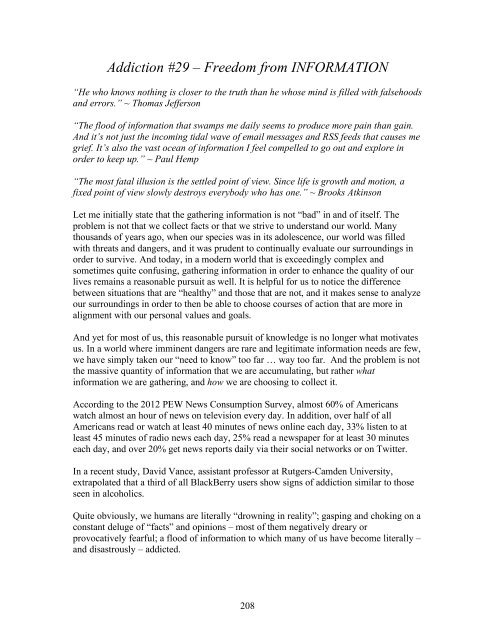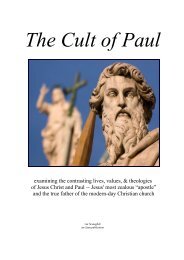Licking the Razor's Edge (2015)
Recognizing the hidden addictions that bind you, … to then set your True Self free
Recognizing the hidden addictions that bind you,
… to then set your True Self free
Create successful ePaper yourself
Turn your PDF publications into a flip-book with our unique Google optimized e-Paper software.
Addiction #29 – Freedom from INFORMATION<br />
“He who knows nothing is closer to <strong>the</strong> truth than he whose mind is filled with falsehoods<br />
and errors.” ~ Thomas Jefferson<br />
“The flood of information that swamps me daily seems to produce more pain than gain.<br />
And it’s not just <strong>the</strong> incoming tidal wave of email messages and RSS feeds that causes me<br />
grief. It’s also <strong>the</strong> vast ocean of information I feel compelled to go out and explore in<br />
order to keep up.” ~ Paul Hemp<br />
“The most fatal illusion is <strong>the</strong> settled point of view. Since life is growth and motion, a<br />
fixed point of view slowly destroys everybody who has one.” ~ Brooks Atkinson<br />
Let me initially state that <strong>the</strong> ga<strong>the</strong>ring information is not “bad” in and of itself. The<br />
problem is not that we collect facts or that we strive to understand our world. Many<br />
thousands of years ago, when our species was in its adolescence, our world was filled<br />
with threats and dangers, and it was prudent to continually evaluate our surroundings in<br />
order to survive. And today, in a modern world that is exceedingly complex and<br />
sometimes quite confusing, ga<strong>the</strong>ring information in order to enhance <strong>the</strong> quality of our<br />
lives remains a reasonable pursuit as well. It is helpful for us to notice <strong>the</strong> difference<br />
between situations that are “healthy” and those that are not, and it makes sense to analyze<br />
our surroundings in order to <strong>the</strong>n be able to choose courses of action that are more in<br />
alignment with our personal values and goals.<br />
And yet for most of us, this reasonable pursuit of knowledge is no longer what motivates<br />
us. In a world where imminent dangers are rare and legitimate information needs are few,<br />
we have simply taken our “need to know” too far … way too far. And <strong>the</strong> problem is not<br />
<strong>the</strong> massive quantity of information that we are accumulating, but ra<strong>the</strong>r what<br />
information we are ga<strong>the</strong>ring, and how we are choosing to collect it.<br />
According to <strong>the</strong> 2012 PEW News Consumption Survey, almost 60% of Americans<br />
watch almost an hour of news on television every day. In addition, over half of all<br />
Americans read or watch at least 40 minutes of news online each day, 33% listen to at<br />
least 45 minutes of radio news each day, 25% read a newspaper for at least 30 minutes<br />
each day, and over 20% get news reports daily via <strong>the</strong>ir social networks or on Twitter.<br />
In a recent study, David Vance, assistant professor at Rutgers-Camden University,<br />
extrapolated that a third of all BlackBerry users show signs of addiction similar to those<br />
seen in alcoholics.<br />
Quite obviously, we humans are literally “drowning in reality”; gasping and choking on a<br />
constant deluge of “facts” and opinions – most of <strong>the</strong>m negatively dreary or<br />
provocatively fearful; a flood of information to which many of us have become literally –<br />
and disastrously – addicted.<br />
208


















